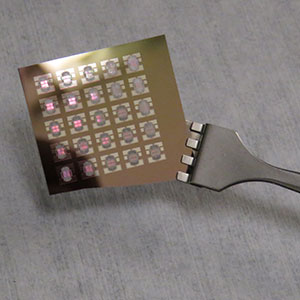Calendar Icon
Apr 14, 2017
Person Bust Icon
By Karl Vogel
![]() RSS
Submit a Story
RSS
Submit a Story

RELATED LINKS
One of the biggest problems with computers, dating to the invention of the first one, has been finding ways to keep them cool so that they don't overheat or shut down.
Instead of combatting the heat, two University of Nebraska-Lincoln engineers have embraced it as an alternative energy source that would allow computing at ultra-high temperatures.
Sidy Ndao, assistant professor of mechanical and materials engineering, said the development of a NanoThermalMechanical device – or a "thermal diode" -- is the result of more than three years of work by his research group after it flipped the question around when considering ways to better cool computers.
"If you think about it, whatever you do with electricity, you should be able to do with heat because they are similar in many ways," Ndao said. "In principle, they are both energy carriers. If you could control heat, you could use it to do computing and avoid the problem of overheating."
A paper Ndao co-authored with Mahmoud Elzouka, a graduate student in mechanical and materials engineering, was published in the March edition of Nature's Scientific Reports. In it, they documented their "microdevice" working in temperatures as high as 600 degrees Kelvin (about 630 Fahrenheit).
Ndao said he expects it would also work in heat as high as 1,300 degrees Fahrenheit. This, Ndao said, could have major implications in many industries.
"We are basically creating a thermal computer," Ndao said. "It could be used in space exploration, for exploring the core of the earth, for oil drilling, many applications. It could allow us to do calculations and process data in real time in places where we haven't been able to do so before."
The innovative thermal diode would allow not only for using an energy source that has long been overlooked, Ndao said, it would also be possible to limit the amount of energy that gets wasted.
"It is said now that nearly 60 percent of the energy produced for consumption in the US is wasted in heat," Ndao said. "If you could harness this heat and use it for energy in these devices, you could obviously cut down on waste and the cost of energy."
Before that happens, the next step is making the device more efficient and making a physical computer that could work in the highest of temperatures.
Both Ndao and Elzouka said they are not interested in creating a company around this work because there is still much more work to be done. They are awaiting the issuance of a patent now that their application has moved out of the disclosure phase, and there is still work to be done to improve the diode and its performance, Elzouka said.
"If we can achieve high efficiency, show that we can do computations and run a logic system experimentally, then we can have proof of concept," Elzouka said. "Then is when we can think about the future."
Ndao, though, has even bigger ambitions for his group's research.
"We want to to create the world's first thermal computer, and hopefully one day it will be used to unlock the mysteries of outer space, explore and harvest our own planet's deep-beneath-the-surface geology and harness waste heat for more efficient energy utilization."
Submit a Story
